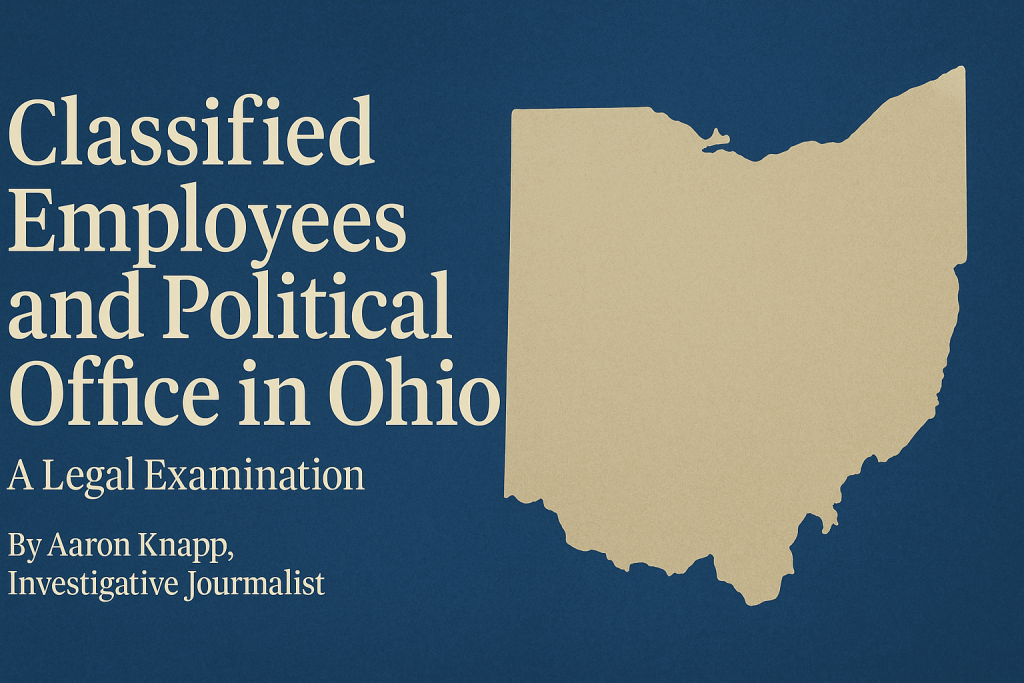Classified Employees and Political Office in Ohio: A Legal Examination

By Aaron Knapp, Investigative Journalist
Apr 27, 2025
Introduction: The Legal Framework of Public Service and Political Neutrality
In Ohio, public employees in the classified civil service are expected to operate above the political fray. Their duty is to serve the public interest impartially, ensuring that partisan politics do not interfere with governmental operations. This expectation is not merely a norm—it is codified in law under Ohio Revised Code §124.57.
Under §124.57, classified employees are barred from participating in partisan political activities. Specifically, they are prohibited from running for partisan office, soliciting political contributions, serving as officers in political parties, or circulating partisan petitions. These restrictions are designed to preserve public trust and guarantee that government services are administered fairly and without political favoritism.
Thanks for reading Aaron’s Substack! Subscribe for free to receive new posts and support my work.
Unclassified employees, by contrast, often serve in roles involving policy discretion or confidential advising. They are not subject to these same restrictions, provided their roles truly meet Ohio’s strict legal definitions under §124.11(A). However, the question of classified versus unclassified status often proves pivotal—and contentious.
Civil service laws protect not just government employees, but the integrity of the system itself. The moment classified employees engage in partisan politics, the neutrality and legitimacy of the public service are called into question. Enforcement of these standards is critical; otherwise, the public may begin to view government operations through a lens of cynicism and distrust.
The cases that follow, ranging from minor infractions to massive scandals, offer clear lessons: the boundaries between public service and political ambition must be respected. When they are not, the consequences are serious—and public confidence is the ultimate casualty.

Case Study: Stephanie Kunze — Crossing the Line and Correcting Course
In 2009, Stephanie Kunze was employed as a secretary at Norwich Elementary School in Hilliard, Ohio, a position squarely classified under Ohio’s civil service system. According to reports by The Columbus Dispatch (May 2009), Kunze made the decision to run in the Republican primary for Hilliard City Council—a partisan office—while still serving in her classified role.
Kunze’s entry into the political race immediately raised legal and ethical questions. School administrators, aware of the restrictions imposed by Ohio Revised Code §124.57, reportedly advised her that her candidacy could conflict with her classified employment. The warning was not simply internal. Public attention quickly focused on whether she was violating state law by continuing her employment while campaigning for partisan office.
Rather than contest the issue, Kunze took swift action. After winning the Republican primary, she resigned from her classified position at Norwich Elementary. In a public statement, she said, “After careful consideration, I have decided to resign from my position to ensure that there is no conflict between my public employment and my candidacy. Public trust must come first.” (Columbus Dispatch, May 2009).
The resignation avoided a potential formal complaint or investigation by the Hilliard City Schools administration or the Ohio Civil Service Employees Association. Had Kunze refused to resign, she could have been subject to removal under civil service disciplinary procedures, which in serious cases allow for termination without the need for progressive discipline.
Kunze’s decision underscores an important aspect of civil service law: ignorance of classification status is not a defense. Even if an employee is unaware of the prohibition, continued engagement in prohibited activities can still trigger removal under §124.57.
Moreover, Kunze’s case highlights the necessity for proactive communication by public employers. While Kunze received informal guidance, there was no formal certification by her employer regarding the conflict. In larger jurisdictions, human resources departments are typically tasked with monitoring and advising employees on political restrictions, but compliance often depends on employee self-reporting.
In subsequent interviews after her election to City Council, Kunze emphasized the importance of ethics in public service. “Being transparent with the public and following the rules is essential. Trust is everything in public service,” she stated during a post-election interview with ThisWeek News (October 2009).
Stephanie Kunze would go on to serve not only on Hilliard City Council but eventually in the Ohio House of Representatives and the Ohio Senate. Her early compliance with civil service law arguably spared her reputation long-term damage and allowed her to build a political career on a foundation of ethical behavior.
Kunze’s story is a reminder that even unintentional violations of civil service laws can have significant consequences—but that corrective action, taken quickly and transparently, can restore public trust.
Case Study: Steve Kraus — A Felony, a Forfeited Seat, and a Breach of Trust
Steve Kraus’s political story is not merely a footnote in Ohio history—it is a cautionary tale. Kraus was elected to the Ohio House of Representatives in November 2014, defeating a longtime incumbent in a surprising upset. However, even before he could take the oath of office, legal troubles engulfed his victory.
According to reporting by The Sandusky Register (December 2014) and The Toledo Blade (July 2015), Kraus was indicted on felony charges including burglary, theft, and breaking and entering. The charges stemmed from allegations that Kraus unlawfully entered a residence while working as an auctioneer and removed property.
Despite the pending indictment, Kraus was seated in the Ohio House in January 2015. Many legislators expressed private concerns about the appropriateness of his seating. “It’s awkward, and it puts the institution in a difficult position,” one unnamed lawmaker told The Columbus Dispatch (January 2015).
Kraus pleaded not guilty and maintained that the case was politically motivated. “This is a misunderstanding, and I look forward to clearing my name,” he said publicly after his indictment (Sandusky Register, December 2014).
However, the facts told a different story at trial. In July 2015, a jury convicted Kraus of a fifth-degree felony theft charge. Under Ohio Constitution Article II, Section 4, any legislator convicted of a felony is immediately disqualified from office. Consequently, Kraus’s seat was declared vacant within hours of his conviction.
The immediate impact was stark. Constituents in his district found themselves without a representative. “It’s embarrassing for our community,” one Erie County voter told The Sandusky Register (July 2015). The Ohio House itself faced public scrutiny for not having acted earlier to address the situation.
Kraus was sentenced to a 180-day suspended jail term, placed on probation, and ordered to pay restitution. Speaking after the sentencing, Kraus stated, “I accept the court’s decision, though I maintain that my intentions were never criminal.” (Toledo Blade, August 2015).
The Kraus case demonstrated how quickly legal issues can strip an elected official of public trust—and office itself. Although Kraus’s offense was unrelated to civil service classification rules, it still illuminated an important principle: those entrusted with public office are held to the highest standards of conduct. Misconduct—even outside the scope of political activity laws—destroys that trust irreparably.
Ultimately, Kraus’s case was a reminder that public officials must not only avoid actual wrongdoing but also avoid circumstances that can erode confidence in their fitness to serve.
Case Study: Clayton Luckie — From Lawmaker to Inmate
Clayton Luckie was a rising figure in Ohio politics, representing the 39th District in the Ohio House of Representatives. Yet his career, once full of promise, ended in scandal and incarceration. His story illustrates how ethical lapses and financial misconduct can destroy both personal ambitions and public confidence.
In October 2012, Luckie was indicted on 49 felony counts, including theft in office, money laundering, and forgery, as reported by The Dayton Daily News (October 2012). Prosecutors accused Luckie of misusing campaign funds for personal expenses, including home repairs and gambling debts. He was also charged with collecting paychecks from the Ohio House while doing little official work.
Despite the seriousness of the charges, Luckie initially refused to resign. “I intend to continue serving my constituents until the end of my term,” he said in a defiant statement to reporters (Dayton Daily News, October 2012). However, mounting pressure from legislative leaders and public outcry made his position untenable.
Facing overwhelming evidence and the possibility of decades in prison, Luckie ultimately agreed to a plea deal. In January 2013, he pleaded guilty to eight felony counts, including grand theft and money laundering. As part of the agreement, dozens of other charges were dismissed.
In court, Luckie apologized to the citizens of Ohio. “I have failed the public trust, and for that, I am deeply sorry,” he told Judge Eileen T. Gallagher at his sentencing (Cleveland.com, January 2013). The judge sentenced Luckie to three years in prison and ordered restitution.
Public reaction was harsh. Editorials across Ohio condemned Luckie’s actions as emblematic of deeper ethical failures in state politics. “Clayton Luckie’s downfall is a reminder that vigilance over public dollars must be constant,” the Columbus Dispatch editorial board wrote in January 2013.
The Ohio House quickly moved to replace Luckie, but the scandal left scars. Voters in Dayton and surrounding areas expressed outrage that taxpayer dollars had been misused with so little early oversight.
More troubling, Luckie’s crimes exposed gaps in campaign finance monitoring and legislative accountability. Despite clear red flags—such as unexplained cash withdrawals and suspicious spending—internal oversight mechanisms failed to catch his misconduct early.
Clayton Luckie’s case became a rallying point for calls to tighten ethics laws, improve financial disclosure standards, and create stronger auditing systems for campaign accounts. His fall from grace was not just a personal tragedy; it was a systemic warning.
In the end, Luckie’s name became synonymous with betrayal of public trust in Ohio—a sobering lesson in how unchecked ambition and corruption corrode the very institutions they are meant to serve.
Case Study: W. Carlton Weddington — Selling Out the Public for Personal Gain
W. Carlton Weddington, a Democrat representing Columbus’s 27th District, seemed to embody a new generation of leadership when he took office in 2009. By 2012, however, he became infamous—not for legislation, but for being the first sitting Ohio legislator in nearly a century to be convicted of bribery.
The charges stemmed from an FBI sting operation that began in 2010. According to federal prosecutors and reporting by The Columbus Dispatch (March 2012), undercover agents posing as lobbyists offered Weddington expensive trips, meals, and financial favors. In exchange, he agreed to draft and introduce legislation that would benefit their supposed businesses.
Among the most damning evidence: Weddington accepted a luxury trip to Miami, including airfare, hotel accommodations, and lavish entertainment—all expenses paid by the fake lobbying firm. As revealed by the FBI, Weddington later filed false ethics disclosure forms, failing to report these gifts as required by law.
“I made decisions for the wrong reasons,” Weddington said in federal court as he pleaded guilty to bribery, attempted bribery, and filing a false financial disclosure (Columbus Dispatch, March 14, 2012). “I take full responsibility for my actions.”
The public was stunned. Legislative leaders moved swiftly to distance the General Assembly from the scandal. Then-House Speaker William Batchelder stated, “This betrayal of the public trust is an affront to the institution of the Ohio House. We will not tolerate it.” (Columbus Dispatch, March 2012).
Weddington formally resigned his seat on March 13, 2012, the day he pleaded guilty. Under federal sentencing guidelines, he received a 36-month prison sentence and was ordered to repay more than $20,000 in illicit benefits. His once-promising political career was over.
Perhaps most damaging was the breach of public faith. Weddington was seen as a rising star—a young, energetic African American legislator representing a diverse Columbus district. His fall shook the public’s faith in the idea that new leadership would mean cleaner politics.
In the aftermath, Ohio strengthened certain ethics requirements. Legislators were required to attend additional ethics training, and there were renewed calls for real-time disclosure of gifts and financial contributions.
The Weddington case exposed a simple but devastating truth: even small-scale corruption by elected officials can cause widespread cynicism. As one editorial in The Cleveland Plain Dealer put it, “When legislators put their price tag above their oath of office, the cost is paid by every citizen.” (March 2012).
Case Study: Larry Householder — The $60 Million Scandal That Rocked Ohio
Larry Householder once commanded enormous influence as Speaker of the Ohio House of Representatives. First elected Speaker in 2001, and again in 2019, Householder’s career ended in spectacular disgrace. In 2020, he was arrested as the central figure in a $60 million federal racketeering conspiracy—one of the largest political corruption cases in Ohio history.
According to the United States Attorney’s Office for the Southern District of Ohio, Householder and four associates orchestrated a massive bribery scheme. Energy company FirstEnergy allegedly funneled tens of millions of dollars into a dark money group controlled by Householder. In return, Householder shepherded the passage of House Bill 6, a $1.3 billion bailout for two failing nuclear power plants owned by a FirstEnergy subsidiary.
“This was likely the largest bribery and money-laundering scheme ever perpetrated against the people of the state of Ohio,” said U.S. Attorney David M. DeVillers during the press conference announcing Householder’s arrest (DOJ Press Release, July 21, 2020).
The FBI’s investigation revealed that FirstEnergy’s money fueled Householder’s political comeback, financed attack ads against his opponents, and bought loyalty from legislative candidates. In turn, Householder’s team pushed House Bill 6 through the legislature in 2019, even amid public outcry and warnings from watchdog groups.
Householder was re-elected Speaker without opposition in January 2019—a position he maintained until his indictment in July 2020. He was expelled from the Ohio House in June 2021, the first lawmaker to suffer such a fate in 150 years.
Throughout his legal troubles, Householder insisted he was innocent. “I never took a bribe. I never sold my office. And I intend to fight these charges to the end,” he told The Columbus Dispatch in August 2020. But jurors disagreed. In March 2023, a federal jury convicted Householder of racketeering conspiracy after a seven-week trial.
At his sentencing hearing in June 2023, Judge Timothy Black delivered a scathing rebuke. “You abused the power of your office. You sold the statehouse. You betrayed the people of Ohio,” Black said, before sentencing Householder to 20 years in federal prison—the maximum allowed (DOJ Sentencing Memo, 2023).
The impact of the Householder scandal is still rippling through Ohio politics. House Bill 6 remains controversial. FirstEnergy has admitted its role, paid a $230 million penalty, and fired top executives. Meanwhile, legislative leaders continue to face public skepticism about transparency and accountability.
The Householder case shattered illusions that corruption was a thing of Ohio’s past. As the FBI stated bluntly: “Dark money is the lifeblood of corruption.” Without reforms to political funding laws, watchdogs warn, future scandals are inevitable.
Larry Householder’s downfall is a vivid reminder that unchecked political ambition, coupled with opaque money flows, can rot the foundations of democracy.
Case Study: Antonio Baez — A Classified Employee’s Silent Violation
Antonio Baez’s time as an elected official in Lorain, Ohio’s 6th Ward presents one of the clearest examples of how classified employment rules can be quietly violated when oversight is weak and accountability is lacking. His story, though local, carries important lessons about how seemingly “small” legal violations damage public trust.
Baez was sworn in as Lorain City Councilman for Ward 6 in early January 2024 after winning election in a partisan race. At the same time, he continued working full-time as a police officer for Sheffield Lake, Ohio. Police officers are considered classified employees under Ohio civil service law and are prohibited by Ohio Revised Code §124.57 from running for or holding partisan political office.
Despite this clear legal conflict, Baez served on Lorain City Council for nearly a full year — from January 2024 until his resignation on February 6, 2025. During this time, he continued collecting a full salary and benefits from his position as a Sheffield Lake police officer. His dual employment situation went largely unnoticed publicly until concerned citizens and journalists began raising questions in early 2025.
Official records show Baez was appointed as a full-time officer on February 13, 2024, meaning he was simultaneously employed by Sheffield Lake and serving as a partisan council member in Lorain for 359 days. His violation of civil service rules was ongoing, not a brief or technical oversight.
Neither the City of Sheffield Lake nor the City of Lorain intervened during this time. No internal investigations were launched. No ethics reviews were conducted. Local officials either failed to notice the problem or chose to ignore it.
When Baez quietly resigned from City Council in February 2025, he gave no public explanation for his departure. Lorain’s administration also declined to comment. Sheffield Lake officials simply confirmed Baez remained a full-time officer “in good standing” at the time of his resignation.
Legal analysts point out that under Ohio law, Baez’s service on City Council while being a classified employee was an outright violation of §124.57. Classified employees, including police officers, are prohibited from candidacy for partisan office, let alone holding such office while remaining employed.
The consequences of Baez’s actions, and the silence of the institutions involved, were damaging. Constituents questioned why no one enforced the law earlier. “If there are rules for public employees, why don’t they have to follow them like everyone else?” one Lorain resident asked at a council meeting in March 2025 (Meeting Minutes, Lorain City Council, March 2025).
Baez’s case illustrates how unchecked legal violations corrode public trust. If civil service rules are seen as optional, if elected officials or administrators are perceived as protecting their own, then faith in the fairness of government itself deteriorates.
The lesson from Baez is stark: civil service laws are not technical formalities. They are guardrails designed to ensure the public’s business remains impartial, fair, and above politics. When those guardrails are ignored, democracy suffers.
Case Study: Jeff Bearer — Unclassified Status and the Importance of Getting It Right
Jeff Bearer’s situation provides a necessary counterbalance to the other examples discussed in this report. His candidacy for Lorain City Council Ward 7 raised serious questions about public employment, civil service classification, and political eligibility. However, unlike others who violated the law, Bearer’s situation demonstrated the importance of accurate classification analysis—and why following the proper legal process matters.
At the time of his candidacy, Bearer was employed as the Chief Deputy Recorder for the Lorain County Recorder’s Office. Initially, critics questioned whether his position was classified, which would have barred him from running for partisan office under Ohio Revised Code §124.57. The controversy arose because under civil service law, classified employees must refrain from partisan electioneering, while unclassified employees (those in discretionary, administrative, or fiduciary roles) are exempt.
The Recorder’s Office responded by asserting that Bearer’s position was unclassified under Ohio Revised Code §124.11(A)(9), which covers deputies of elected officials who exercise fiduciary or administrative authority. Further, internal documentation and a legal review by the county prosecutor’s office confirmed that Bearer’s duties involved acting on behalf of the elected Recorder, managing daily office operations, supervising staff, and handling official decisions in the Recorder’s absence.
The legal principle here is clear: according to both Ohio case law and guidance from the Ohio Attorney General’s Office, the actual duties performed, not the title or label attached to the position, determine whether an employee is classified or unclassified. As the Ohio Supreme Court explained in State ex rel. Charlton v. Corrigan, 36 Ohio St.3d 68 (1988), classification hinges on “the nature of the position, not the characterization given it by the employer.”
Based on Bearer’s documented job functions, he was properly categorized as unclassified. As such, there were no restrictions on his ability to run for partisan office. No violation of §124.57 occurred, and no enforcement action was necessary.
The significance of Bearer’s case is twofold. First, it demonstrates that not every public employee candidacy raises legal problems. Unclassified employees—if correctly designated based on actual duties—retain their constitutional rights to political participation, including the right to seek partisan elected office.
Second, Bearer’s case also illustrates why strict adherence to classification standards is vital. Had Bearer’s role been misclassified without proper fiduciary duties, his candidacy could have violated civil service laws. Moreover, public perception of favoritism or manipulation of civil service status could have damaged trust, even if technically legal.
Even though Bearer ultimately acted within his rights, the scrutiny he faced reflected a broader truth: the public expects—and deserves—clear, transparent, and honest application of employment classifications, particularly when political office is involved.
As a final note, Bearer’s situation indirectly highlights the danger posed by earlier violations by others like Antonio Baez. Because some officials had in fact violated civil service law without consequence, legitimate candidates like Bearer faced additional skepticism, public suspicion, and unfair scrutiny simply for participating in the political process legally.
In a healthy democracy, the rule of law must apply uniformly. When that standard is upheld, as it was here, it strengthens—not weakens—the system.
Case Study: Andrew Lipian — Resignation as a Restoration of Public Trust
Unlike the many cautionary tales of civil service violations and political ambition run amok, Andrew Lipian’s conduct offers a model for how public officials should handle potential legal conflicts. His story illustrates that doing the right thing—even when personally costly—strengthens public trust and preserves the integrity of public office.
Andrew Lipian, a Marine veteran and First Ward Councilman in Elyria, Ohio, was simultaneously employed by Lorain County’s Community Development Department in 2024. His county job was reportedly a classified civil service position under Ohio law, subject to the restrictions imposed by Ohio Revised Code §124.57. Classified employees, as established, are prohibited from participating in partisan elections or holding partisan offices.
In May 2024, after internal review and public inquiry, Lorain County officials determined that Lipian’s classified employment status created a conflict with his partisan elected position on Elyria City Council. Rather than challenge the finding or delay action, Lipian immediately resigned his county job.
In a public statement to The Chronicle-Telegram (May 29, 2024), Lipian announced, “Effective immediately, I am resigning my position with Lorain County Community Development. I have always maintained that transparency and respect for the rule of law are fundamental values for any public servant.”
Unlike some others who ignored or evaded similar conflicts, Lipian chose integrity over personal convenience. He gave up a stable government salary to ensure compliance with civil service restrictions and to avoid any appearance of impropriety while continuing to serve his constituents on City Council.
Lipian’s resignation demonstrated an understanding that even the appearance of a conflict undermines public confidence. As he later told constituents during a city council meeting in June 2024, “Public trust isn’t something you inherit. It’s something you earn every day through your actions.” (Elyria Council Minutes, June 2024).
His decision also shielded the City of Elyria and Lorain County from potential litigation or political fallout. By proactively removing himself from the conflict, Lipian preserved institutional credibility and avoided entangling two different public bodies in a legal controversy that could have otherwise drawn lawsuits, ethics complaints, or administrative investigations.
Importantly, Lipian’s resignation did not just comply with the letter of the law—it upheld its spirit. The civil service rules exist to protect the impartiality of government, and by honoring those rules voluntarily, Lipian strengthened the legitimacy of both the County and the City Council he serves.
While his move was personally inconvenient, it exemplified leadership rooted in accountability. Ethical compliance is not always easy or immediately rewarding, but Lipian’s case shows that principled action can preserve political careers and build long-term public respect.
In a political environment increasingly tainted by scandals, resignations under pressure, and legal technicalities, Andrew Lipian’s decision stands out as a reminder that public service still demands sacrifice—and that honoring the law is the true mark of character.
Final Thought
By Aaron Knapp, Investigative Journalist
The case studies documented here—from the quiet violations of local officials to the breathtaking criminal conspiracies at the highest levels of Ohio government—reveal a troubling pattern: the erosion of public trust when civil service and political ambition collide. These were not obscure rules broken by accident. They were fundamental protections enshrined in law to safeguard the impartiality of government and the Constitution itself.
Ohio Revised Code §124.57 was never intended to be optional. It was built on the simple premise that government employees, particularly those in the classified civil service, must operate free from partisan pressure. When officials like Antonio Baez disregard those restrictions, knowingly or not, it degrades the public’s faith in the neutrality of their government.
Worse still, every instance of rule-breaking, however small it may seem, opens the door to larger abuses. If classified employees feel empowered to run for partisan office with no consequences, it invites a culture where the law is bent for convenience rather than upheld out of principle. The Constitution demands better—and so should the people it protects.
If not for the Baezes of the world, we would not be forced to scrutinize legitimate public servants like Jeff Bearer. Misconduct by a few casts a cloud over everyone. Even those who are correctly classified and ethically compliant are subjected to doubt and suspicion simply because others failed to respect the law.
Contrast that failure with the example set by Andrew Lipian. Upon learning that his county employment created a legal conflict, Lipian immediately resigned his classified position. He did not wait for an investigation. He did not parse words or hide behind technicalities. He chose the harder right over the easier wrong—and in doing so, he preserved both his office and the public’s trust.
Ethical conduct in public service is not merely about avoiding prosecution. It is about honoring the fragile bond between the governed and those entrusted to govern. Every violation—whether it results in prison time like Larry Householder’s, or a quiet resignation like Baez’s—tears at that bond.
The Constitution is not merely a historic document. It is a living promise of fairness, equality, and accountability. Classified employees who flout restrictions on political activity, elected officials who sell influence for bribes, and administrators who look the other way all betray that promise. Their actions are not victimless. The victim is democracy itself.
In a time when cynicism toward government is at historic highs, the duty to enforce ethical rules becomes even more urgent. Public institutions must be more than legally compliant; they must be morally defensible. Ohioans deserve a civil service that plays by the rules—not one that picks and chooses when the rules matter.
The public must demand better. If we do not hold public servants accountable to the standards they swore to uphold, we risk losing more than just individual offices or elections. We risk losing the very idea that government exists to serve, not rule. And that is a price far too high to pay.
Sources and References
- Ohio Revised Code §124.57 — Prohibitions against classified employees engaging in partisan political activity.
https://codes.ohio.gov/ohio-revised-code/section-124.57 - Ohio Revised Code §124.11 — Classified and unclassified service definitions.
https://codes.ohio.gov/ohio-revised-code/section-124.11 - The Columbus Dispatch — “Norwich Elementary secretary quits to run for Hilliard Council,” May 2009.
(Referenced in Stephanie Kunze case study.) - ThisWeek News — Interview with Stephanie Kunze post-election, October 2009.
- The Sandusky Register — “Newly elected state rep faces felony charges,” December 2014.
(Referenced in Steve Kraus case study.) - The Toledo Blade — “State Rep. Steve Kraus convicted of theft,” July 27, 2015.
- Dayton Daily News — “Luckie indicted on 49 felony counts,” October 24, 2012.
(Referenced in Clayton Luckie case study.) - Cleveland.com — “Former Ohio lawmaker Luckie sentenced to three years in prison,” January 2013.
- The Columbus Dispatch — “Weddington pleads guilty in bribery case,” March 14, 2012.
(Referenced in W. Carlton Weddington case study.) - United States Department of Justice — Press Release: “Ohio Speaker of the House Arrested in $60 Million Bribery Scheme,” July 21, 2020.
(Referenced in Larry Householder case study.) - The Columbus Dispatch — “Householder vows to fight charges,” August 2020.
- United States District Court, Southern District of Ohio — Sentencing Memorandum, United States v. Larry Householder, June 29, 2023.
- Lorain City Council Public Records — Meeting minutes regarding Antonio Baez resignation, February–March 2025.
- The Chronicle-Telegram — “Elyria Councilman Andrew Lipian resigns from county job,” May 29, 2024.
(Referenced in Andrew Lipian case study.) - Elyria City Council Official Minutes — Lipian’s statement on transparency, June 2024.
- State ex rel. Charlton v. Corrigan, 36 Ohio St.3d 68 (1988) — Key Ohio Supreme Court decision regarding civil service classification.
(Cited in Jeff Bearer case study.) - Internal Lorain County Documents — Classification confirmation documents for Chief Deputy Recorder position (available through FOIA requests).




